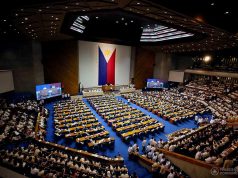House starts crunching budget numbers
THE 18TH CONGRESS has begun hearings on the proposed P4.1-trillion national budget for 2020, with the House of Representatives targeting committee approval by Sept. 11 and final approval in plenary session by Oct. 4 before lawmakers take a month-long break.
The proposed spending plan for next year is 12% more than the P3.662-trillion 2019 budget and is 19.4% of gross domestic product (GDP), with planned infrastructure expenditure topping spending priorities at P972.5 billion, equivalent to 4.6% of GDP.
Top officials of the Development Budget Coordination Committee (DBCC) — made up of the Department of Budget and Management, National Economic and Development Authority, Department of Finance and the Bangko Sentral ng Pilipinas (BSP) — on Thursday briefed lawmakers on the proposed budget’s macroeconomic assumptions. The proposed budget is designed to propel overall economic expansion to a faster 6.5-7.5% in 2020 from a targeted 6-7% this year, with headline inflation supportive at a muted 2-4% after last year’s decade-high 5.2%.
Revenue collections are targeted at P3.573 trillion — about 16.9% of GDP — in order to help cover disbursements programmed at P4.21 trillion, equivalent to 19.9% of GDP. That will leave a P637.6-billion fiscal deficit equivalent to three percent of GDP.
Asked on the economic impact of another reenacted budget next year, Socioeconomic Planning Secretary Ernesto M. Pernia said GDP expansion could fall “probably below five percent,” recalling that in the nine years under former president Gloria M. Arroyo — who became House speaker in the last regular session of the 17th Congress that ended in June — that saw some national budgets reenacted, overall economic growth averaged just 4.6%.
Mr. Pernia said reenacting the budget again is “not going to be good because… government spending and even private spending on fixed capital formation will be hampered…”
Economic managers were also asked whether the proposed 2020 budget remains “cash-based” — a scheme started last year by former Budget chief and now Bangko Sentral ng Pilipinas Governor Benjamin E. Diokno in order to ensure that state offices get only what they have proven they can spend within the fiscal year. The shift last year to that scheme led to a spat between the Budget department and the House, since it whittled down the proposed national budget for 2019 — an election year — to P3.757 trillion, compared to 2018’s P3.767 trillion. The spat left little time for the Senate to deliberate on the budget, and subsequent accusations by both legislative chambers that the other had made irregular fund insertions led to the four-month delay in national budget enactment.
House Speaker Alan Peter S. Cayetano had said in a press briefing on Tuesday that the House will be holding plenary sessions two hours later at 5 p.m. in order to give committees more time to work on the budget. The budget is supposed to be approved by the House first, but the Senate plans to hold parallel committee hearings — as practiced in the past — in order to speed up approval in that chamber.
The House Appropriations committee’s proposed budget calendar as of Aug. 14 — unchanged as of Thursday — targets committee approval on Sept. 11, second-reading approval on Sept. 20, third- and final-reading approval on Oct. 4, submission to the Senate on Oct. 8 and approval of the bicameral conference committee report on Dec. 9, in time for signing into law by President Rodrigo R. Duterte by Dec. 20.
The government operated on a reenacted 2018 budget from January to April 15, when Mr. Duterte signed this year’s national budget into law but vetoed P95.3 billion in funds that were not in sync with state priorities, slashing the total to P3.662 trillion.
The DBCC in its March 13 meeting slashed GDP expansion targets for this year (to 6-7% from 7-8% originally) and 2020 (to 6.5-7.5% also from 7-8%), citing constraints from the delayed enactment of the national budget.
Actual GDP expansion clocked in at a disappointing 5.5% last semester against this year’s 6-7% goal, a performance blamed largely on the four-month delay in budget enactment that aggravated the impact of the 45-day public works ban ahead of the May 13 midterm polls. — V. A. C. Ferreras



